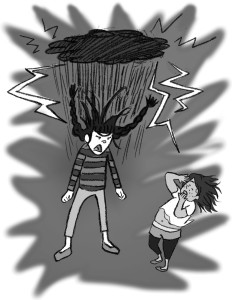Today’s question comes from the mom of a 12-year-old who is feeling her daughter’s pain at being rejected by a long-time bff.
How can I help my daughter deal with rejection? Her friend of six years has a new best friend. My daughter is hurt and desperately trying to win her friend back. What can I do to help her accept that sometimes friends move on?
Rejection comes up a lot in life, so we get lots of practice dealing with it. Either we didn’t get chosen for the team or didn’t get into the school we wanted or didn’t get the job we interviewed for. These are as “institutional” rejections. They sting, but at least they are not truly personal. This 12-year-old is grappling with a very personal form of rejection, being ditched by a close friend who has moved on into the embrace of a new bff. Ouch!
When we talk to our kids about feelings of rejection it’s important to give them a chance to talk about it. “I feel bad! What did I do wrong? Why doesn’t she want to be my friend any more?!” These aren’t necessarily questions that require answers from you. A child asking these questions is most helped by a parent who listens with compassion and patience and understanding. But when this girl talks to Mom about “trying to win her friend back” that is when a parent ought to do more than listen and empathize.
The daughter seems to believe she can change her friend’s mind. Mom can help by providing a reality check (compassionately, of course). Mom needs to tell her there are certain things in life that we can control and certain things we can’t. In the area of what we can’t control: the thoughts, feelings and behavior of other people. In the area of what we can control: our response to what’s going on inside and out.
If someone were to kick me in the shins, I’d yell “Ow!” because it hurt. If someone says, “I don’t want to be your friend” that’s going to hurt, too. But how long will it hurt? And how many times will I play over in my mind those hurtful words? If I’m a healthy, resilient child or adult, I won’t replay it much. Why re-hash something when the hash didn’t taste great to begin with?
Talk to your children about the concept of re-hashing negative thoughts and mental movies. Then say to your child, “Sweetheart, you already have what it takes to be a good friend. You were Emma’s best friend for six years! And that is a great accomplishment. But friendships don’t always last forever.” Now would be a good time to remind your child of the friend she was close to in preschool or third grade who, now in sixth grade, is no longer a close friend. That might help her understand the evolution of feelings and friendships.
My best advice for helping children dealing with rejection:
a) Let kids express how they feel without your interrupting, correcting, or invalidating those feelings.
b) Prompt kids to think and talk about what, if anything, they might have done to contribute to the rejection. Relationships are a two-way street and it’s good for them to acknowledge what they might have done or failed to do to keep the friendship healthy and strong.
c) Brainstorm with kids about how they might respond next time they are rejected. It’s important for them to recognize they always have options in the way they behave.
d) Encourage them to think about a candidate who might become their next best friend.
These conversations will empower your child. It will also strengthen your bond and help your child become more resilient.














